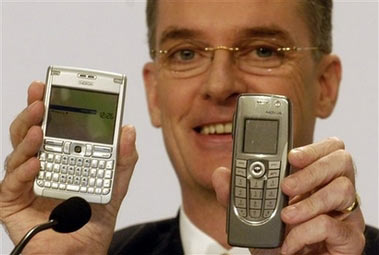Nokia Corp. and Siemens AG said Monday they will combine their network
equipment units in a reported $30 billion joint venture to more effectively take
on market leader LM Ericsson.

Simon
Beresford-Wylie, CEO-designate of Nokia Siemens Networks, poses with
mobile phones during a press conference in Frankfurt, Germany, Monday,
June 19, 2006. Siemens and Nokia Corp. said Monday they will combine their
mobile network operations to create a joint venture with annual revenues
of 15.8 billion euro (US$20 billion), a move that will help them compete
with market leader Ericsson AB. [AP Photo] |
The combination, to be called Nokia Siemens Networks, would create one of the
largest players in the industry, with $20 billion in annual sales. Besides
Ericsson, it also puts pressure on Lucent, Alcatel, Motorola and Nortel
Networks.
The 50-50 venture would comprise Nokia's network business group and Siemens'
carrier-related operations, creating estimated savings of $1.9 billion by 2010
through an estimated 9,000 job cuts globally, Nokia said.
"The new company will and has to have an attitude of a challenger, fiercely
competitive with an unerring focus on the customer, because at the end of the
day, eventually, it is the customer who will decide," Nokia's new Chief
Executive Olli-Pekka Kallasvuo said.
As the communications industry consolidates, he said, Nokia Siemens Networks
would be well-positioned to help customers, carriers and service providers,
lower costs and increase revenue while managing the challenges of converging
technology.
Consumers never see the equipment, but experience it through more reliable
service, faster connections and more features.
The deal is the latest in a wave of consolidation that began last October,
when Stockholm-based Ericsson agreed to buy Marconi Corp.'s broadband Internet
and telecommunications assets for about $2.1 billion. In April, Paris-based
Alcatel launched a $13.4 billion stock swap for Lucent Technologies Inc.
The Siemens-Nokia venture is likely to put pressure on Motorola Inc., which
will drop from the No. 3 provider of network equipment to No. 4. Also left out
is Canada's Nortel Networks Corp.
In Frankfurt, shares of Siemens closed up 6.6 percent at 66.99 euros ($84.34)
in Frankfurt, after surging as much as 8 percent earlier in the day. In
Helsinki, shares of Nokia, which had risen as high as 5 percent, finished at
16.12 euros ($20.29), or up 3 percent.
Analysts have said there are an estimated 2.5 billion cell phone users around
the world, a figure that is expected to increase as handset prices fall and
operators lower subscription prices.
Mobile services providers such as T-Mobile, Vodafone or O2, are increasingly
looking for the technology and equipment that will let them provide bigger,
faster and better content to subscribers.
"Nokia has had difficulties being real strong on the network side. Now they
will have a better position and this will also help on the cell phone side,"
said David Larsson, an analyst with IT Research in Stockholm.
"Siemens is a company with major technical competence and with good
connections to the computer side, and they have a very strong position on the
European market. Ericsson's system business will have a tougher challenger now."
Commenting on Nokia's ailing networks sector that often has offset the
company's exceptional performance in the handset sector, Kallasvuo stressed the
company's aim to improve its performance in the sector and expand operations.
"This means that Nokia is expanding its network operations," Kallasvuo said.
"It is growing bigger, albeit with a partner. But it means that Nokia will be
putting more into the division, and is a clear indication that Nokia, in the
future too, will be extremely committed to this sector and ready to invest in
it."
Klaus Kleinfeld, CEO of Munich-based Siemens, said the deal would position
the new company to tackle Ericsson, which is the top maker and seller of network
equipment.
"This combination creates a leading industry player with immediate strength,
excellent potential for growth and well-positioned to improve future
profitability," he said, adding that Siemens' business networks unit will be
operated separately.
Siemens said in a statement earlier that it would "actively pursue the
consolidation" of the unit and was "in negotiations with several interested
parties."
Simon Beresford-Wylie, chief of Nokia's network operations, will head the new
joint venture.
"We are right behind Ericsson and in a virtual tie with Alcatel," he told
reporters in Frankfurt. "We have a presence in all geographic regions, developed
and developing."
The companies declined to place a value on the deal. The New York Times and
The Wall Street Journal reported it at more than $30 billion, citing unnamed
people familiar with the transaction.
The new company will have some 60,000 employees and be based in the Finnish
capital, Helsinki. It also will have key offices in Munich.
Kallasvuo took over as CEO on June 1 from Jorma Ollila, who during 14 years
at the helm turned Espoo, Finland-based Nokia into the world's largest mobile
phone maker.
Kallasvuo's appointment was widely seen as signaling continuity, but he had
hinted that Nokia would expand its divisions, in part through increasing
corporate purchases.
The joint venture was expected to be finalized by the end of the year,
pending regulatory approval, and both companies said that between 10 percent and
15 percent of staff positions, or about 9,000 jobs, would likely be cut over the
next four years in a bid to save $1.9 billion.
Nokia employs 62,000 people. Siemens, Europe's largest electronics and
electrical engineering company, employs more than 460,000
people.